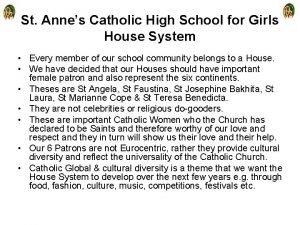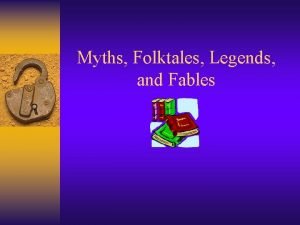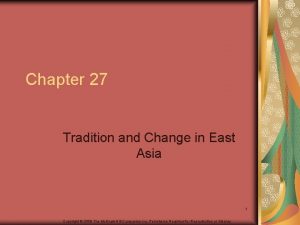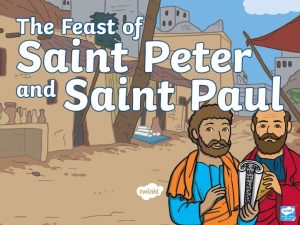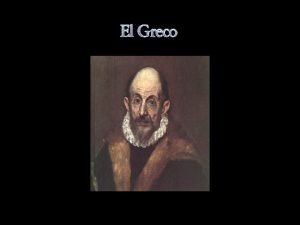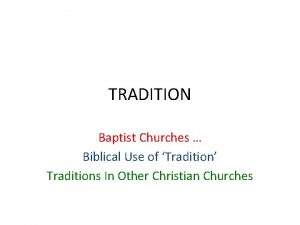Saint Lucia The Legend and Tradition St Lucia






























- Slides: 30

Saint Lucia The Legend and Tradition

St. Lucia was a Roman young woman who became a Christian martyr about 300 AD. Lucia gave her dowry to poor Roman Christians on her wedding day, was condemned as a traitor, and was to be burned at the stake. The flames did not harm her, so her executioners killed her with a sword. Years later, when Sweden was suffering from famine and despair, legend tells how St. Lucia appeared one cold and dark winter night and brought food and light to the people of Sweden. A similar thing happened in Italy. There was a famine, and families gathered in a cathedral on her feast day, Dec. 13 th, to pray. Legend says two ships showed up with wheat, Lucia at the helm. She was dressed in white with candles on her head. (St. Lucia is the patron saint for fishermen and is said to guide them home during rough seas. )

Sweden

The Swedish Lucia is celebrated on Dec. 13 th. On this day, the darkness is brightened by Saint Lucia, a figure of goodness and light who opens the door to the Christmas season. This tradition may go back to the early calendar, in which Dec. 13 th was the winter solstice.

Today, all over Sweden and Swedish America, young women in long white gowns, accompanied by Star boys and attendants, appear to herald the return of light to the earth and the birth of Christ.



In Scandinavian countries, Lucia is honored by young women (the oldest girl in a family, a selected girl in schools and cities). The girl walks, with a crown of candles, ahead of a procession of other women holding a candle each. The candles symbolize the fire that refused to take her life. The women sing a Lucia song while entering the room, describing the light with which Lucia overcomes the darkness. After finishing this song, the procession usually continues by singing Christmas carols or more songs about Lucia.

The song (1 st verse) Natten går tunga fjät runt gård och stuva. Kring jord, som sol'n förlät, skuggorna ruva. Då i vårt mörka hus stiga med tända ljus Sankta Lucia, Sankta Lucia.


Part of the tradition has the young women going from farm to farm (with a crown of candles and carrying a torch) bringing baked goods and returning home by break of day. Every village had its own Lucia. The custom is thought to have begun in some of the richer farming districts of Sweden and still persists although the crowns are now electric lights.

In the home, the oldest daughter brings coffee and St. Lucia buns to her parents, while wearing a candlewreath and singing a Lucia song. Other daughters may help, dressed in the same kind of white robe and carrying a candle in one hand, but only the oldest daughter wears the candlewreath.


There are now also boys in the procession, playing different roles associated with Christmas. Some may be dressed in the same kind of white robe, but with a coneshaped hat decorated with golden stars, called "stjärngossar" (star boys); some may carry lanterns; and some may be dressed up as gingerbread men. They participate in the singing and also have a song or two of their own, usually one telling about St. Stephen, the first Christian martyr, caring for his five horses.


A Saint Lucia coffeecake is the traditional offering on Dec. 13 th. The rich dough is colored and flavored with saffron. Either a large wreath or a plate of individual buns — formed in the shapes of wreaths, crowns and cats — is used for holiday feasts or given to guests who come to call.


In Sweden, making Christmas cookies is an art. Variety is important, and a Swedish hostess usually has at least 7 kinds of cookies on hand. Some might include spritz, pepparkarkor (ginger cookies), Swedish almond cookies, sugar cookies, and cookie rings.


Pepparkakor: The Wish Cookie an Old Swedish Custom Place a Swedish Pepparkakor in the palm of your hand. Then, make a wish. Using the index finger of your free hand, tap the cookie in the middle. Swedish tradition states that if the Pepparkakor breaks into three pieces, your wish will come true. If the Pepparkakor does not break into three pieces, you’ll just have to savor the cookie in smaller portions.


St. Lucia is mostly celebrated in Scandinavia and Southern Europe. Some areas that celebrate include Sweden, Denmark, Norway, Finland, Italy, Bosnia, Iceland, and Croatia.

Denmark

In Denmark, the Day of Lucia (’’Luciadag’’) was first celebrated on December 13, 1944. The tradition was directly imported from Sweden by Franz Wend, secretary of Föreningen Norden, as an attempt "to bring light in a time of darkness. ” Implicitly it was meant as a passive protest against German occupation during the Second World War but it has been a tradition ever since.

The night before, candles are lit and all electrical lights are turned off and on the Sunday closest to December 13, Danes traditionally attend church.

Italy

St. Lucy is popular among children in some regions of North-Eastern Italy, where the Saint brings gifts to good children and coal to bad ones. Children are asked to leave some food for Lucia and for the donkey that helps her carry gifts (flour, sugar, or salt) and they must not see Santa Lucia delivering gifts; otherwise, she will throw ashes in their eyes, blinding them.

In Sicily, a bonfire commemorates Lucia and residents abstain from eating bread and pasta.


Regardless of where it is celebrated, there is a deep connection to the past, and hope for the future.
 February 3 saint
February 3 saint Le lieu saint du tabernacle
Le lieu saint du tabernacle St annes catholic high school for girls
St annes catholic high school for girls Title date and legend are three
Title date and legend are three Kinds of story
Kinds of story Myths legends and fables
Myths legends and fables Map with legend compass rose and scale
Map with legend compass rose and scale Kerala culture and tradition
Kerala culture and tradition Features of a folktale
Features of a folktale Chapter 27 tradition and change in east asia
Chapter 27 tradition and change in east asia Chapter 27 tradition and change in east asia
Chapter 27 tradition and change in east asia Chapter 26 tradition and change in east asia
Chapter 26 tradition and change in east asia Tragedy and tradition by raymond williams
Tragedy and tradition by raymond williams Chapter 27 tradition and change in east asia
Chapter 27 tradition and change in east asia Tradition vs innovation
Tradition vs innovation T. s. eliot tradition and the individual talent
T. s. eliot tradition and the individual talent Hát kết hợp bộ gõ cơ thể
Hát kết hợp bộ gõ cơ thể Frameset trong html5
Frameset trong html5 Bổ thể
Bổ thể Tỉ lệ cơ thể trẻ em
Tỉ lệ cơ thể trẻ em Voi kéo gỗ như thế nào
Voi kéo gỗ như thế nào Chụp tư thế worms-breton
Chụp tư thế worms-breton Chúa yêu trần thế
Chúa yêu trần thế Môn thể thao bắt đầu bằng chữ đua
Môn thể thao bắt đầu bằng chữ đua Thế nào là hệ số cao nhất
Thế nào là hệ số cao nhất Các châu lục và đại dương trên thế giới
Các châu lục và đại dương trên thế giới Công thức tiính động năng
Công thức tiính động năng Trời xanh đây là của chúng ta thể thơ
Trời xanh đây là của chúng ta thể thơ Mật thư anh em như thể tay chân
Mật thư anh em như thể tay chân Phép trừ bù
Phép trừ bù độ dài liên kết
độ dài liên kết


